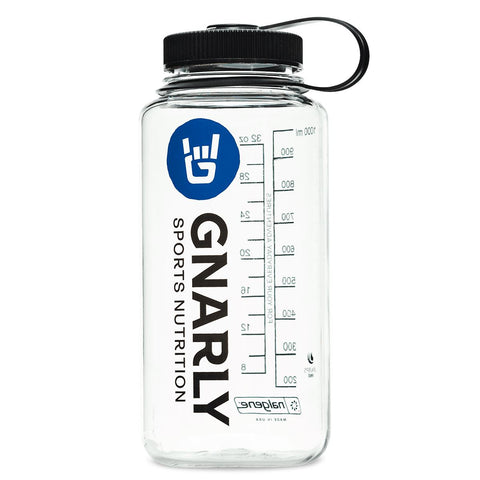Most people are broadly aware of the importance of being hydrated for overall health. Yet, dehydration on athletic performance is understated. Proper hydration leads to higher athletic performance, but athletes only replace about half of the water lost during exercise (8). What happens to the body when we aren’t hydrated enough for our athletic endeavors?
Water in the body helps create cushions, helps joints move smoothly, regulates our body temperature, and plays a direct role in brain function. Each day we lose 1-2 liters of water due to body functions like breathing and using the bathroom. The primary concern with hypohydration or dehydration within athletes is fatigue due to a drop in our blood’s plasma. Our blood comprises two parts: red blood cells that carry oxygen and plasma, which is the water-like fluid that carries substances around.

As mentioned, the main concern with dehydration in athletes is due to a drop in plasma volume within the blood, followed by the second concerning factor, carbohydrate availability. Rehydrating takes much longer than eating something to improve carbohydrate availability. Athletes should prevent dehydration since changes in plasma volume are more complex. While exercising, the skin and muscles compete for nutrient-filled blood. Blood prioritizes the working muscles; a lesser amount of blood goes to the skin to promote sweating to cool the body off and release heat produced by the body. Humans sweat during exercise to reduce internal heat storage (14). When our body notices decreased water levels like during exercise, the brain communicates with the kidneys to open up special channels, called aquaporins, which tell the blood to retain more water. More water in our blood leads to darker urine. As we lose water by breathing and sweat during movement, our plasma volume continues to drop, leading to thicker blood. When our blood has less water in it, it is more vicarious or "thick." Thicker blood has a more challenging time traveling throughout the body, leading to the even higher body and skin temperatures. Increasing core temperatures places more stress on the body and eventually leads to heat stroke and exhaustion. There are temperature markers within the body with hopes of cooling off for protection. When our muscle temperature reaches 102 degrees Fahrenheit, our muscles' part that triggers contractions begins to break down. Once our core temperature goes above 104 degrees Fahrenheit, our central nervous system tells our body to slow down or stop moving altogether. The process is faster in hot environments where an athlete isn't used to the environment (14).
In general, dehydration is linked with a higher strain on the body during exercise. It makes activities feel more challenging (7). The higher pressure is due to increased core temperature, higher sweat rate, and the heart working harder during exercise than rest. Add dehydration to the mix; we now have the body struggling to cool down and move oxygenated blood less efficiently to working muscles. The physical changes that occur to the body can impact various athletic pursuits differently. It is essential to consider the demands of your sports and hobbies to ensure you’re establishing and maintaining good hydration.

As endurance athletes know, long-duration exercise raises body temperature and the amount you sweat to cool the body. Research shows finishing an endurance activity being sufficiently hydrated is rare, meaning dehydration is more common than not (12). Much evidence suggests starting an endurance activity under-hydrated reduces physical performance and capacity (6). As mentioned earlier, dehydration causes blood to be more viscous than when an athlete is hydrated. Having enough water in the blood makes oxygen flow to working muscles easier, allowing an athlete to perform at their highest capacity. Too little water makes the heart work harder than usual. It can limit the maximum amount of oxygen an athlete can take into the body (2).
When dehydrated, our muscles use more carbohydrates as fuel at lower intensities. Higher carb utilization makes starting a race hydrated and having solid intake essential to avoid bonking from under-fueling (8, 9). A decrease of 2% of body mass due to sweating lowers the lactate threshold (14). A lower lactate threshold means the body cannot use the lactate produced by working muscles and accumulates in the body, leading to faster fatigue.
Endurance events are unique in their need for considering nutrient uptake during long training sessions and races. Decreases in blood plasma volume change how our body absorbs nutrients, like carbohydrates and electrolytes like sodium. During the prolonged activity, blood moves away from the digestive tract, the primary organs for absorption. A runner or cyclist who consumes fuel during long events should focus on mitigating these changes because these choices play an essential role in performance (14). Making things more challenging, plain water has a poor absorption rate due to the lack of drivers for absorption. Absorption drivers include glucose, sodium, and potassium (14). Endurance athletes need to drink to replace fluids lost from sweat. Consuming an electrolyte solution with 6-8% carbohydrates during training and competition is a great way to do so. The recommendation is that athletes drink 500 mL of this fluid combination one to two hours before a race or run greater than one hour long. Regularly consuming water on a schedule, 3 to 8 ounces every 10 to 20 minutes, to replace the water loss will make an athlete feel better, contributing to improved performance (12, 14, 16).

Dehydration also impacts maximum strength and power production in athletes. Decreases in strength and power can affect endurance athletes too. Higher performing runners and cyclists produce more energy per stride at lower heart rates compared to lower-level athletes, thus making them more efficient. A lower hydration level can have an impact on even the best athletes. Creating more power and moving more weight during weight training sessions can positively affect preventing injuries and preparing the body for your sport regardless of what you do.
When our hydration is suboptimal, our mind, also known as cognition, is negatively impacted. The psychological strain is directly proportional to physical stress due to dehydration (15). Downward cognitive shifts can take a toll on skill-based tasks in sport. Skill-based actions in sport rely on a combination of cognition and motor skills learned through practice. Motor skills and their accuracy also decline without proper hydration (5, 17). For example, a skill-based task in climbing would be rope management or cornering while mountain biking. Take cornering; if you shift your weight inappropriately while taking a turn while riding downhill, it could result in a fall or run off the trail. Another skill-based action impacted by hydration is pacing strategies in endurance sports (15). The chances of making errors you usually don’t make are higher when your hydration status is lower than optimal, which can be detrimental depending on the situation. Some sports rely more on sound decision-making, like mountaineering or backcountry skiing. The impacts of dehydration on decision-making are similar to other forms of cognition; it dampens, which could mean life or death depending on the sport. To avoid impairment, being adequately hydrated gives us a solid judgment base when performing in high-stakes situations that athletes would otherwise compromise (4).
Athletes who travel for their sport or expose themselves to changes in the environment may change their risk for dehydration. General traveling makes us more prone to dehydration for a few reasons, adding to environmental changes. First, planes are pressurized to several thousand feet above sea level and typically are dry (11). Exposure to different pressures causes the body to work harder to get oxygen to our organs and muscles. An increased breathing and heart rate leads to higher body temperature and more water loss through sweating (10). Going to places with drastic changes in temperature and humidity impacts our bodies and how they perform. Warm environments raise the body’s core temperature triggering a response to prevent more heat development by slowing down. The hotter the climate, the more the body depends on sweat to get rid of extra heat (12, 13). Consuming more water-electrolyte fluids and adapting to new temps can prevent further decreases in performance. Humid settings impact the body’s ability to thermoregulate or maintain a suitable internal temperature (3). Cold and dry locations have a similar effect as drops in temperature cause us to lose more water through breathing; this is why you can see your breath(3)! High altitude environments tend to be less humid, similar to planes. Being at a higher elevation, like while climbing a mountain, exposes athletes to sun and wind, contributing to accelerated sweating. These settings also cause athletes to urinate more frequently. Research has shown that our thirst drive is lower too, which increases our dehydration risk. Aside from the impact of these environments, being dehydrated while engaging in sports at higher elevations decreases aerobic capacity or cardiovascular strength (10). Being adequately hydrated while traveling and playing in the mountains can make it easier for athletes to carry an adequate amount of water during their activities. Athletes can benefit from planning for environmental changes to perform at their highest level in a new location.

Both elite and recreational athletes can benefit from enough fluid intake, both physically and mentally. Optimal hydration status enhances the quality and intensity of training, making more optimal performance gains. Regardless of your level, if you’re looking for a competitive edge, adequate hydration could be just that! Hydration needs vary between athletes and sport-specific factors. Depending on your sport and whether you’re acclimated to an area can also impact hydration needs. Each athlete should consider their needs and the demands of their sport when creating a hydration plan or schedule. When in doubt, consulting with a Registered Sports Dietitian is a great way to get professional advice.
Tips to improve your hydration practices:
- Set the alarm on your smartphone or watch to remind yourself to hydrate.
- When purchasing hydration supplements, buy more than one flavor. You’ll be less likely to “get sick” of flavors.
- Plan and hydrate the days leading up to and before long endurance efforts.
- Weighing yourself before and after an activity is a great way to monitor how much water was lost and not replenished during a workout. Remember - a 2% drop in weight from water loss can mean decreased athletic performance. For a more specific measurement, purchasing pee strips that measure the specific gravity of your urine is even more concise (6, 14).
- Although hydration needs are individualized, aiming for 3 to 8 ounces of a carbohydrate-electrolyte beverage every 10 to 20 minutes during prolonged exercise is a good rule of thumb (12, 14, 16).
References
- Belval, L. N., Hosokawa, Y., Casa, D. J., Adams, W. M., Armstrong, L. E., Baker, L. B., ... & Wingo, J. (2019). Practical hydration solutions for sports. Nutrients, 11(7), 1550
- Cheuvront, S. N., & Kenefick, R. W. (2011). Dehydration: physiology, assessment, and performance effects. Comprehensive Physiology, 4(1), 257-285.
- Daniel Tang, K.H. (2021). A review of the association between environmental factors and athletic performance. Journal of Specific Sport Science, 1(1), 21-30.
- Fortes, L. S., Nascimento-Júnior, J. R., Mortatti, A. L., Lima-Júnior, D. R. A. A. D., & Ferreira, M. E. (2018). Effect of dehydration on passing decision making in soccer athletes. Research quarterly for exercise and sport, 89(3), 332-339.
- Hillyer, M., Menon, K., & Singh, R. (2015). The effects of dehydration on skill-based performance. Int J Sports Sci, 5(3), 99-107.
- James, L. J., Moss, J., Henry, J., Papadopoulou, C., & Mears, S. A. (2017). Hypohydration impairs endurance performance: a blinded study. Physiological reports, 5(12), e13315.
- Ladd, E., Shea, K. M., Bagley, P., Auerbach, P. S., Pirrotta, E. A., Wang, E., & Lipman, G. (2016). Hydration status as a predictor of high-altitude mountaineering performance. Cureus, 8(12).
- Logan-Sprenger, H. M., Heigenhauser, G. J., Jones, G. L., & Spriet, L. L. (2015). The effect of dehydration on muscle metabolism and time trial performance during prolonged cycling in males. Physiological Reports, 3(8).
- Logan-Sprenger, H. M., M. S. Palmer, and L. L. Spriet. 2011.Fluid and sodium balance in elite male junior players during an ice hockey game. Appl. Physiol. Nutr. Metab.36:145-152
- Luks, A. M., Ainslie, P. N., Lawley, J. S., Roach, R. C., & Simonson, T. S. (2021). Ward, Milledge and West’s High Altitude Medicine and Physiology. CRC Press.
- Şabanoğlu, C. (2021). The secret enemy during a flight: Economy class syndrome. Anatolian Journal of Cardiology, 25(Suppl 1), S13.
- Sawka, M. N., Cheuvront, S. N., & Kenefick, R. W. (2015). Hypohydration and human performance: impact of environment and physiological mechanisms. Sports Medicine, 45(1), 51-60.
- Sawka M.N., R.R. Gonzalez, A.J. Young, R.C. Dennis, C.R. Valeri, and K.B. Pandolf. 1989. Control of thermoregulatory sweating during exercise in the heat. American Journal of Physiology 257:R311-R316.
- Sims, S. The Science of Hydration.
- Tucker R..2009. The anticipatory regulation of performance: The physiological basis for pacing strategies and the development of a perception-based model for exercise performance. British Journal of Sports Medicine 43:392-400.
- Von Duvillard SP, Braun WA, Markofski M, Beneke R, Leithäuser R. Fluids and hydration in prolonged endurance performance. Nutrition. 2004 Jul-Aug;20(7-8):651-6. doi: 10.1016/j.nut.2004.04.011. PMID: 15212747
- Wittbrodt, M. T., & Millard-Stafford, M. (2018). Dehydration impairs cognitive performance: a meta-analysis. Med Sci Sports Exerc, 50(11), 2360-2368.





